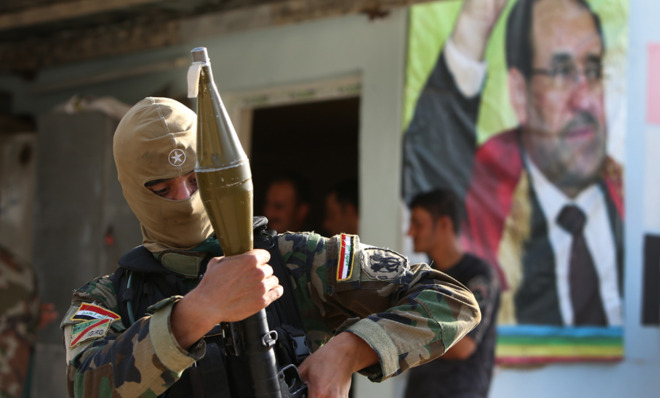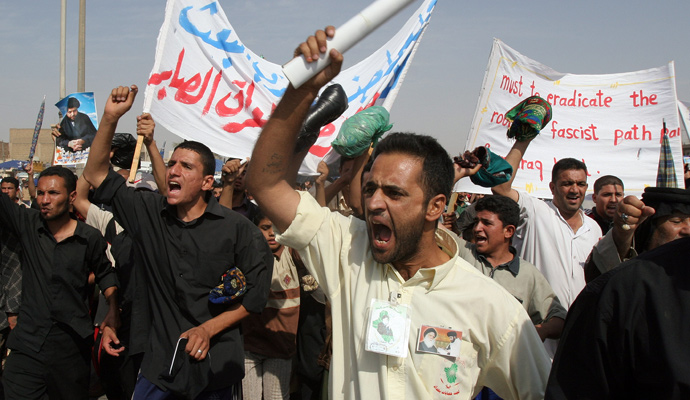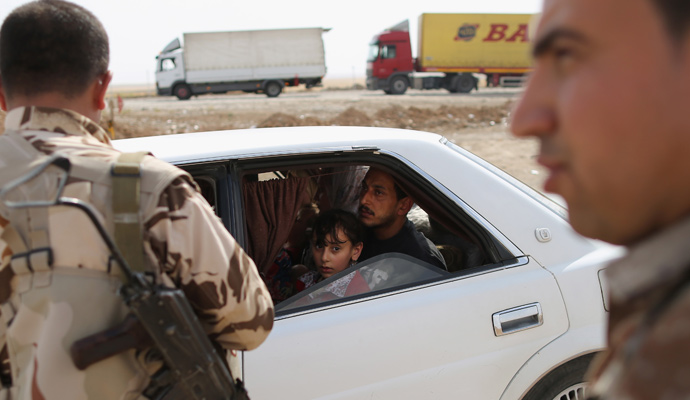How Maliki ruined Iraq
Not long ago, stability and security in Iraq seemed possible. Maliki's corruption shattered any hopes of that.

A free daily email with the biggest news stories of the day – and the best features from TheWeek.com
You are now subscribed
Your newsletter sign-up was successful

When Mosul fell to the Islamic State of Iraq and al-Sham (ISIS) on June 10, most Iraqis were, like the rest of the world, shocked. When two other cities fell days later with minimal resistance from the Iraqi security forces, the response was horror. How in just a matter of days could a cancerous, extremist organization defeat Iraq's U.S.-trained security forces, which count more than one million personnel in their ranks and have received close to $100 billion in funding since 2006?
The truth is, nothing is surprising about the developments in Iraq right now. Nor was any of this inevitable.
Four years ago, Iraq finally had relatively good security, a generous state budget, and positive relations among the country's various ethnic and religious communities after years of chaos following the U.S.-led invasion in 2003. But Iraq's political elites squandered this opportunity. Their corruption and hunger for power distracted them from emerging crises — like the rise of ISIS — and laid the groundwork for what is now taking place.
The Week
Escape your echo chamber. Get the facts behind the news, plus analysis from multiple perspectives.

Sign up for The Week's Free Newsletters
From our morning news briefing to a weekly Good News Newsletter, get the best of The Week delivered directly to your inbox.
From our morning news briefing to a weekly Good News Newsletter, get the best of The Week delivered directly to your inbox.
By 2008, al Qaeda-affiliated militias and death squads no longer swarmed the country from Samarra to Mosul as they had just two years before. U.S. officials, state security services, tribal forces, and some armed groups had forged an agreement to work together against the most extreme groups terrorizing Iraq's population. The major roads in those areas were lined with the flags of the Awakening Councils, and local fighters had decided to protect ordinary Iraqis from al Qaeda. In time, the Iraqi military was deployed in all major cities and set up checkpoints every few miles.
Although unemployment, corruption, and failing public services were still major problems, ordinary Iraqis in the areas that had been dominated by al Qaeda still breathed a collective sigh of relief. They could go back to work, resume their studies, and relax outdoors without the constant ring of gunfire in the background. Families took their children to the river, where they swam and picnicked, while young men made regular trips to Kirkuk or Baghdad to stock up on local Iraqi beer.
(More from Foreign Policy: One billion drinkers can be wrong)
There was also at this time a consensus that the Iraqi Army consisted of honorable, patriotic soldiers who treated local people with respect. The public had grown hostile toward al Qaeda and other insurgent groups and was siding with the state and its army. The atmosphere in small towns like Tikrit was relaxed, and people casually mixed with soldiers and police, exchanging jokes and pleasantries.
A free daily email with the biggest news stories of the day – and the best features from TheWeek.com
It was a new atmosphere and it was full of promise.
Iraqis were demanding more from their politicians than mere survival. Prime Minister Nouri al-Maliki established a new political alliance, the State of Law alliance, which campaigned on a platform of re-establishing strong state institutions, reducing corruption, and providing adequate services to the people. The Iraqiya alliance, another large and newly formed coalition, backed a similar platform. The tantalizing prospects of establishing a new political environment and creating a stable state seemed within reach.
It never happened. Rather than consolidating these gains, several factors began working against Iraq's national cohesion as early as 2010. Maliki's government used "de-Baathification" laws, introduced to keep members of Saddam Hussein's regime out of government, to target his opponents — but not his many allies, who also had been senior members of the Baath Party. The 2010 government formation process turned out to be yet another opportunity for politicians of all stripes to grant themselves senior positions which they could use to plunder the state. When tens of thousands of Iraqis took to the streets in February 2011 to protest corruption, they were branded terrorists and were attacked and beaten by security forces and hired thugs. Dozens were killed and thousands arrested and tortured until the protests fizzled. Meanwhile, though terrorist groups were not operating as openly as before, hundreds of civilians continued to be killed every month, particularly in Baghdad, denying Iraqis in many parts of the country even a brief period of normalcy.

(More from Foreign Policy: The real red line in the Middle East)
At that time, Maliki began referring to himself publicly as Iraq's preeminent military leader. When the 2010 electoral results did not conform to his expectations, he demanded a recount in his "capacity as commander in chief." When he forced senior anti-corruption officials from their positions, he once again inappropriately invoked his military credentials. He called officers on their mobile phones to demand specific actions or that individuals be arrested, circumventing the chain of command. After the new government was formed in November 2010, he refused to appoint ministers of the interior and of defense, preferring to occupy both positions himself. He appointed senior military commanders directly, instead of seeking parliamentary approval as required by the constitution.
There was also much talk about the prime minister's special forces, including the Baghdad Operations Command. Groups of young men were arrested in waves, often in the middle of the night, and would be whisked to secret jails, often never to be seen again. Former Army officers, members of the Awakening, activists who complained too much about corruption, devout Iraqis who prayed a little too often at their local mosques — all were targeted. Many were never charged with crimes or brought before a judge. Under the pretext of trying to stop the regular explosions that blighted Baghdad, these individuals were subjected to severe abuse.
By 2012, the atmosphere in Tikrit had changed. Joking with the police and the Army had ended. Tikritis were desperately looking for detained relatives, but information was almost impossible to obtain even for the best-connected. The relationship of trust that the Army had built with the general population was ruined by the special forces' activities.
Then there was the corruption. The security sector, which had an annual budget greater than the budgets for education, health, and the environment combined, was subject to minimal oversight. Soldiers were enrolled and paid monthly salaries without reporting for duty. Overpriced and faulty equipment was procured using the laxest standards. Training sessions were financed on paper but never took place in practice. Appointments were politicized. Officers close to the prime minister's office who failed to investigate leads on terrorist attacks were almost never held accountable for their actions. Even the most grotesque failures, including the military's passivity in the face of regular attacks against Christians in Ninevehover a period of years, went unpunished. Morale among the rank and file was low, and there was very little desire to take risks on behalf of political elites who were viewed as wildly corrupt.
(More from Foreign Policy: Indyk admits Mideast peace process is dead)
Against this backdrop, many of the armed gangs that had terrorized local populations from 2005 to 2007 now saw their opportunity to re-emerge. They still could not operate in broad daylight, but they understood that the security forces could be manipulated, and they identified the weakest link in each institution. Those officers who could most easily be bribed or who were willing to participate in illegal activities were brought on board; those who could be intimidated were threatened; and those who were most likely to interfere with their operations were targeted in their homes, to terrify their families.
By 2012, armed groups were once again mounting organized and coordinated attacks against major institutions in broad daylight. With time, the attacks became so frequent that several officers were targeted daily in Tikrit alone. A clear trend was developing, and nothing was done to address it. The city was suddenly too dangerous even for a short family visit, and ordinary people were once again locking themselves indoors.
The gust that eventually blew the security sector's house of cards away came from the conflict in Syria, which had given al Qaeda a new lease on life. Shortly after Syria's civil war began in 2011, the al Qaeda-affiliated fighters who had been forced to stop their operations in Iraq in 2008 remobilized and rebranded themselves as ISIS. They remained particularly active in Mosul, where they ran an incredible racketeering operation and continued to hit government forces hard.

When ISIS escalated with a full-on assault on Mosul this month, all of the Iraqi state's pathologies came together in a perfect storm of corruption and incompetence. This left the city virtually defenseless. People in Mosul and soldiers have told me that a consensus has formed that members of the military's rank and file were ordered to abandon their posts either shortly before or at the start of ISIS's assault. There is still significant mystery as to why the withdrawal took place at all. Rumors have been circulating. The most outlandish accusation is currently being made by Maliki and his allies, who have accused the Kurdistan Regional Government of colluding with ISIS against the Iraqi state.
The incompetence of the Iraqi security forces was further underscored in the days that followed the fall of Mosul. As the jihadists began to advance, residents in Tikrit, around 130 miles south, expected that ISIS would overrun their city at any moment. Anyone who has been to Tikrit knows that it would be extremely easy to fend off an invasion by ISIS gunmen, because there is essentially a single highway that runs through the city center. All that would have been needed to protect the city would have been to position a few armored vehicles with limited air support along the highway. Yet there was no reaction from Baghdad, which is just a two-hour drive away. Tikrit was seized in a couple of hours, and hundreds of Army recruits were taken hostage. Having been abandoned by their government, many of those individuals appear to have been executed.
The failures of Iraq's governing class — and the U.S. occupation forces — to create even a single stable national institution will haunt the country for years to come. On the day Tikrit fell, Iraq suddenly changed: Violent government-backed militias were suddenly allowed to operate openly in Baghdad and Baquba, manning checkpoints and organizing security without any oversight. Senior Iranian military commanders landed in Baghdad to help organize the city's defense. Finally, in an effort to rally his base against ISIS, Maliki called for volunteers to take up arms against the militants and extremists — ignoring the fact that the military's problem was never a lack of manpower.
It was the clearest admission of failure possible. Maliki micromanaged the security forces for years, and in the end he didn't even trust them, choosing instead to let foreign-backed militias and untrained volunteers defend the capital. Meanwhile, one week after Tikrit's fall, Baghdad had done nothing to free it from ISIS, abandoning its citizens to their fate and allowing the militants to reinforce their positions free from interference.
The United States has made it clear that Washington now views Maliki's government as part of the problem. "Iraqi leaders must rise above their differences and come together [to forge] a political plan for Iraq's future," President Barack Obama said in a press conference. Secretary of State John Kerry was dispatched to the Middle East to help bring about political reconciliation between Iraq's factions. But the damage that the prime minister and his cronies have inflicted on Iraq cannot be undone. The end result of Iraq's unending series of unforced errors will almost certainly be yet more flattened cities, hundreds of thousands more displaced, and yet more damage to its people's sense of community. What solution could there be to prevent this tragedy, if the Iraqi political class will not admit to the smallest of errors?
-
 The Olympic timekeepers keeping the Games on track
The Olympic timekeepers keeping the Games on trackUnder the Radar Swiss watchmaking giant Omega has been at the finish line of every Olympic Games for nearly 100 years
-
 Will increasing tensions with Iran boil over into war?
Will increasing tensions with Iran boil over into war?Today’s Big Question President Donald Trump has recently been threatening the country
-
 Corruption: The spy sheikh and the president
Corruption: The spy sheikh and the presidentFeature Trump is at the center of another scandal